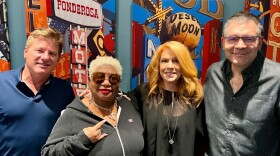With COVID-19 infections rates below 5 percent, the most restricted of the local industries is beginning to re-emerge. We’re talking entertainment.
Production shows are reopening. Residencies are being announced. Venues are preparing for concerts.
Even Electric Daisy Carnival is gunning for its return next month.
Is momentum - and science - finally on the side of the most battered area of the local economy?
“The shows, especially the smaller residency shows and the smaller production shows, have figured out a way to get back on stage in the face of very challenging directives,” said Las Vegas Review-Journal columnist John Katsilometes, who has been covering entertainment in Las Vegas since the 1990s.
Katsilometes credits that resiliency to the flexibility and innovation of the performers, producers and directors, and their abilities to figure "out a way to get a show on stage in front of a reduced audience that’s socially distanced and still make money.”
He said that over the past year many entertainers and producers have been frustrated at the directives from the COVID task force and Gov. Steve Sisolak's office.
Many have felt the restrictions were not specific to the live entertainment industry, leaving them to figure it out on the fly. However, that sentiment is changing as the industry starts to reopen.
“These shows are feeling they can come back at 50 percent capacity for 250 people, for example, with a six-foot distance in front of the stage with masks, 12 feet without, and go from there," he said. "That is refreshing for them.”
So far, the reason more small shows have returned and fewer big production shows are back on stage is the finances, Katsilometes said. A large production show costs more money to stage, which means they need a large number of people to buy tickets to make it worth their while.
Another problem can be the configuration of the venue. For instance, "Absinthe" is only selling about 160 tickets, when pre-pandemic it sold 550 to 650 tickets for both of its nightly shows. Katsilometes said to safely stage the show in its current venue, it has to spread out the audience, which is about 160 tickets. Those limits are putting a strain on the show's producers, Spiegelworld.
“They need to get back to where they were the real engine of that company,” he said.
The same is true of Cirque du Soleil's "O" at the Bellagio. That is why "O" is expected to return to the stage before "Mystere" at TI, even though "Mystere" is a less expensive show to stage.
“MGM Resorts is very interested in getting ‘O’ back up and running because it is a proven hit," he said. "It is one of their signature hotels, and they can, frankly, use the business."
Surprisingly, Katsilometes said, one of the biggest entertainment success stories during the pandemic has been small — and sometimes off-Strip — venues like Notoreity at Neonopolis downtown and the Vegas Room at Commercial Center.
“[The latter is] a small supper club. They’ve had kind of Broadway-caliber talent in a very small venue,” Katsilometes said.
Pandemic restrictions have not hindered everyone, especially these smaller venues.
“That has actually worked in large part because the pandemic has increased demand and reduced opportunity for live entertainment," he said. "So people are finding these places. It’s a deeper bench and there are more opportunities for live entertainment than I think people have realized.”
Besides production shows, large and small, Las Vegas is home to star performers who perform at one showroom for multiple shows a year.
Katsilometes said residency shows like Lady Gaga at the Park Theater are likely to return before touring musicians return to venues like T-Mobile Arena and Allegiant Stadium.
One of the first residencies that have announced a return date is Usher at the Colosseum at Caesars Palace.
“That’s an indicator," he said. "If they can get the Usher show at full capacity and full production value in June, we will have achieved something in Las Vegas.”
Southern Nevada has also become home to top festivals, including the Electric Daisy Carnival, which is set to welcome 200,000 people to the Las Vegas Motor Speedway in May.
Organizers are promising vaccination requirements and onsite rapid testing. They are very motivated to make the festival happen this year, said Katsilometes.
“The message of safety and being safe is front and center," he said. "I never count them out. I never sell them short. I think that if there is anybody who can do that, it's them, and a lot of it is going to depend on what has been allowed across the country, too.”
There could be a change in all of the restrictions put in place to stop the spread of COVID-19 starting May 5. The statewide emergency order imposed March of 2020 is set to be lifted, Katsilometes said.
After the order is lifted, it will be up to individual counties to decide restrictions, which could mean more nuanced and targeted rules, he said.
Gov. Steve Sisolak has been criticized and praised for his response to the pandemic. Katsilometes believes Sisolak nonetheless understands the importance of live entertainment to Las Vegas.
“It’s been so difficult to wrap all of entertainment around a single philosophy because we have so much variety in Las Vegas all the way from Allegiant Stadium all the way down to the Vegas Room and all in between.”
John Katsilometes, columnist, Las Vegas Review-Journal










